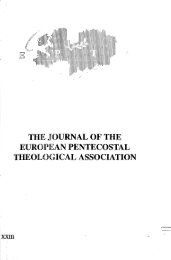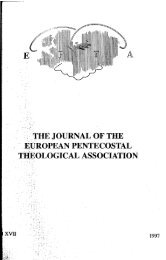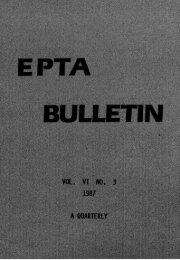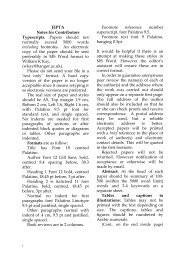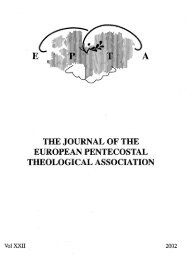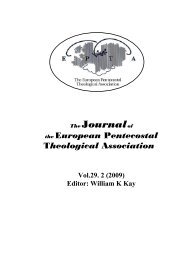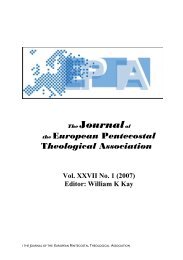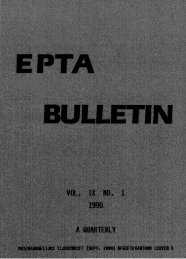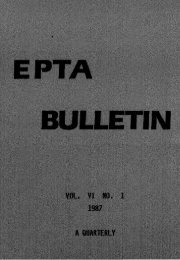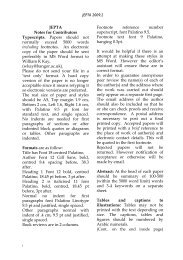jepta 2001 21 - European Pentecostal Theological Association
jepta 2001 21 - European Pentecostal Theological Association
jepta 2001 21 - European Pentecostal Theological Association
You also want an ePaper? Increase the reach of your titles
YUMPU automatically turns print PDFs into web optimized ePapers that Google loves.
The Journal of the <strong>European</strong> <strong>Pentecostal</strong> <strong>Theological</strong> <strong>Association</strong>, Vol. XXI, <strong>2001</strong><br />
<strong>Pentecostal</strong>ism, Past, Present and Future<br />
Interview with Walter Hollenweger by Neil Hudson<br />
In a sense, <strong>Pentecostal</strong>ism is a postmodern movement. It has democratised<br />
theology and liturgy. By doing so, it has contributed to an erosion of the so-called<br />
Christian West. This Christian West was mainly based on a feudal structure, both<br />
in the Catholic and the Protestant church. When this feudal structure collapsed,<br />
the established churches were in trouble. They tried to replace the feudal structure<br />
by a structure of theological propositions. That was always certain to fail.<br />
If <strong>Pentecostal</strong>ism is to survive in Western Europe, it should stop aping the<br />
established churches by seeking refuge in a so-called kernel of propositional<br />
faith. On the contrary, it should strengthen its own means of coherence, that is the<br />
story of Jesus in its many forms and shapes, since the New Testament has at least<br />
five stories of Jesus (the Gospels and Paul). All attempts at systematising these<br />
different stories, without the help of authoritarian church structures, have so far<br />
failed.<br />
Early <strong>Pentecostal</strong>s were characterised by an overwhelming emphasis upon an<br />
imminent eschatology. This has now diminished. Is this significant for the<br />
ongoing development of <strong>Pentecostal</strong>ism or will it be able to recapture this early<br />
Adventist enthusiasm<br />
Early Pent,ecostals published periodicals for twenty or thirty years with titles such<br />
as "The Bridal Call", "I am Coming Soon", "The Last Trumpet".<br />
Understandably, these titles have disappeared together with the underlying<br />
emphasis upon an imminent eschatology. We find a similar development in the<br />
New Testament. Jesus himself expected the kingdom of God during his lifetime<br />
or shortly thereafter. He was disappointed and had to face the cross. Paul and his<br />
friends also expected the parousia to be "around the corner" during their lifetime.<br />
When these hopes proved to be wrong, the synoptic gospels postponed the<br />
kingdom of God but did not give it up. John, the evangelist, changed the<br />
emphasis. For him, the kingdom of God was not mainly in the future but in the<br />
present time. Those who believe already have "life eternal". Those who do not<br />
believe are missing not only "life eternal" but life altogether. However, during a<br />
cruel persecution, Revelation rekindled the hope of an imminent kingdom of God<br />
that would put an end to the brutal regime of the Romans.<br />
What can we learn from this It is my conviction that no church and no theology<br />
can survive without eschatology. Early <strong>Pentecostal</strong> eschatology was based on the<br />
naive understanding that the biblical texts, in particular, Revelation were written<br />
for us. Even a casual reading of the biblical texts shows us that this is not the<br />
case. Revelation, for instance, was written for seven congregations in distress in<br />
Asia Minor, as the address of the book clearly shows. Also, the other biblical<br />
texts were not written for us. None of the biblical authors ever expected their<br />
writings to be read by an English speaking readership. English did not even exist<br />
at that time. So the question remains: what is the eschatology of middle-class<br />
Western <strong>European</strong> <strong>Pentecostal</strong>s I believe that there is such an eschatology. But<br />
it is not a timetable drawn from Revelation and Daniel. Such an eschatology ends<br />
in a sterile time-table eschatology with no spiritual content. This can be clearly<br />
shown by the eschatologies of Seventh Day Adventists or of the Jehovah's<br />
Witnesses. Reading many of the interpretations of Revelation produced during<br />
the last war or during the Stalin era makes one realise that they were not only<br />
slightly mistaken but were actually fbndamentally wrong.<br />
The alternative is not to dismiss eschatology. We need an eschatology which<br />
believes that God will not give up on his creation or his church. We need to<br />
believe that, in his time, God will put right what men and women have put<br />
wrong; that he will not allow creation and his plan of salvation to go bust with, or<br />
without, our co-operation.<br />
Many Classical <strong>Pentecostal</strong>s are attempting to reassess <strong>Pentecostal</strong> doctrine<br />
and its potential benefit for future generations. To what extent do you think<br />
that this is significant In your writings, you seem to place more emphasis<br />
upon <strong>Pentecostal</strong> spiritualiw. Is <strong>Pentecostal</strong> spirituality likely to be sufficiently<br />
robust to survive without the "protection" of doctrinal formulation<br />
Doctrinal formulations have never protected spirituality from withering. If that be<br />
the case, the Roman Catholic Church or even Jehovah's Witnesses would be the<br />
most spiritual churches. The contrary is the case. Doctrine is emphasised when<br />
spirituality begins to die. All churches have experienced that and it has never<br />
worked. It was because of this approach that the <strong>Pentecostal</strong> revival at the<br />
beginning of last century was thrown out of the churches. Another example<br />
would be the fact that as more Catholic believers depart from Vatican theological<br />
positions, the Pope emphasises doctrine to an even greater extent.<br />
<strong>Theological</strong> statements must be rooted in lived spirituality. If that is not the case,<br />
theology becomes idle. I have always believed that <strong>Pentecostal</strong>s could develop a<br />
kind of theological thinking which is not mainly based on the propositions of the<br />
past but on the life experience of the church universal (not just my own<br />
individual experience).<br />
Propositional formulations within a logical system were an invention of Thomas<br />
of Aquinas. He used the methodology of a pagan philosopher (Aristotle) to<br />
articulate the Christian faith. That was a form of syncretism and a stroke of<br />
genius at that time. However, it only works within a philosophical framework<br />
that is acceptable to all. Since that time is now over and since the bible is not of a<br />
logical nature, we have to do systematic or doctrinal theology in another form, for<br />
example, by showing the varieties of possible articulations of Christian faith.<br />
Perhaps the doctrinal questions of the future will be more of a series of intelligent<br />
questions. The doctrinal debate will perhaps no longer be fixated on the possible<br />
answers but on what are the central and vital questions. The propositions of the



